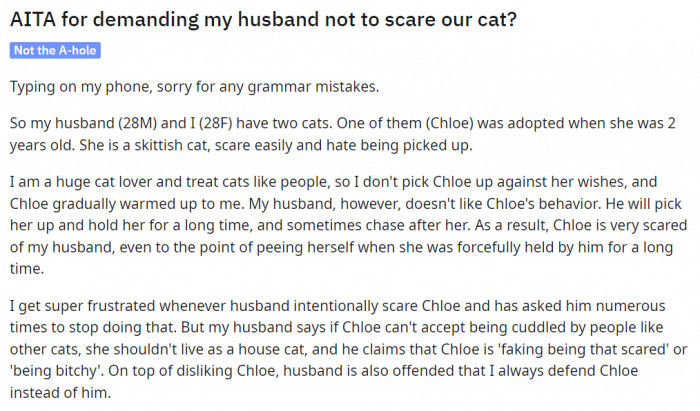Woman On Reddit Thinks That Her Husband Is A Huge Bully For Always Scaring Their Jittery Cat
Do you have cats who are always fearful? Are they constantly freezing in place, scrambling, hiding, or keeping their distance?
Some cats are just like that. Sometimes, even if you establish a safe and cozy space for your cats, they just won't come out of their shell.
Unfortunately, Reddit user Lucky_Kangaroo_ is struggling to provide her family's jittery cat with a fear-free environment. Although she is trying her best to lessen the cat's fearfulness, her husband just won't cooperate.
Why are some cats fearful? According to experts, the fearful and shy behavior of cats stems from negative associations formed during their early development.
For example, if a cat wasn't around people often when she was just a kitten or if she was abused, it will be hard for her to trust her human companions. These situations are common reasons behind a skittish cat.
Sometimes, it's the cat's genetics that make her fearful. Sadly, these are the cats that will take more time to calm down and settle into a new home.
On Reddit, user Lucky_Kangaroo_ asked people on the AITA subreddit if she's the asshole for demanding her husband respect Chloe's boundaries, their skittish cat.
What did the people of Reddit say about the situation? Let's see their responses.
Lucky_Kangaroo_ writes about how mean her husband is to Chloe.

She asks Reddit users if she's the asshole. Fortunately, it seems that the couple has reached a conclusion about their situation.

This Reddit user thinks he's just cruel. The woman explains the intent behind her husband's meanness.

Understanding Fear Responses in Animals
Fear responses in pets, particularly cats, can be influenced by their past experiences and inherent temperament.
Research in animal behavior indicates that animals may react defensively when they perceive threats, leading to stress and anxiety.
This highlights the importance of understanding a pet's background when assessing their behavior.
Understanding Fear-Based Behavior
Fear-based behavior in animals, such as a jittery cat, can significantly influence family dynamics. When one family member's actions evoke fear in a pet, it creates a ripple effect that can distress both the animal and the family unit.
Research from the Journal of Applied Animal Welfare Science indicates that animals respond to perceived threats based on their past experiences, leading to behaviors that seek to avoid further distress.
The Impact of Anxiety on Pet Behavior
Dr. Lisa Monroe, a clinical psychologist specializing in animal behavior, explains that anxiety can significantly affect how pets react to their environment.
Research shows that animals, particularly those with sensitive temperaments, may display heightened anxiety in stressful situations, leading to behavioral issues.
Understanding these dynamics is crucial for pet owners to foster a supportive environment.
These people think that he'll do the same thing to other people, especially his children.

For this user, only the cat is important. The woman is also considering just staying with the cat and not her husband.

More people are criticizing the husband's cruelty to the skittish cat.

A veterinary behaviorist explains that scaring an already anxious animal can exacerbate their fear responses, leading to long-term anxiety issues.
Studies show that animals often develop conditioned responses to fear, which can persist even in the absence of the original trigger.
Recognizing this can help owners understand the potential consequences of their actions on their pets' mental health.
This pattern often reflects a lack of understanding of the animal's emotional state. Studies suggest that recognizing and responding to an animal's fear can enhance the bond between pets and their owners, promoting a more harmonious household.
By fostering an environment where pets feel safe, families can reduce anxiety and improve the overall well-being of their animals.
From a psychological perspective, the husband's actions in this situation may reflect a lack of awareness about the pet's emotional needs.
Studies indicate that owners who are emotionally attuned to their pets tend to create more secure and less anxious environments.
Recognizing the signs of anxiety in pets can help owners respond more compassionately.
This user thinks the husband is on a different level of wrongness.

More people do not understand the husband's reasoning behind 'faking' the feelings.

Been there, done that, according to one user. Then another one drops the bomb on divorce.

The Impact of Anxiety on Animal Behavior
Anxiety in pets can manifest in various ways, including aggression, withdrawal, and behavioral issues.
Research indicates that anxiety can significantly impact an animal's quality of life and overall behavior.
Understanding these effects is crucial for pet owners to foster a supportive and safe environment for their animals.
The Importance of Empathy in Animal Care
Empathy is essential in caring for animals, particularly those who exhibit fearful behavior. When family members understand the emotional needs of their pets, it can lead to more compassionate interactions.
Research from the Journal of Animal Behavior emphasizes that empathy can significantly influence how individuals respond to their pets, fostering a supportive environment that enhances emotional well-being.
The Role of Empathy in Pet Ownership
Empathy plays a vital role in understanding and addressing pet behavior.
Research published in the Journal of Applied Animal Welfare Science shows that empathetic pet owners are more likely to engage in behaviors that reduce anxiety in their animals.
This understanding can help create a more harmonious home environment for both pets and their owners.
Just like the previous comments, these users are concerned about how he'll treat his wife in the future.

Don't we all agree?

Some users agree about rehoming the poor kitty.

To help anxious pets, owners can implement strategies such as gradual exposure therapy and creating secure spaces.
Research in animal behavior suggests that positive reinforcement training can help alleviate anxiety and build confidence in fearful animals.
Creating a stable environment can help mitigate fear responses and promote healthy behavior.
Moreover, employing techniques such as positive reinforcement can help alleviate fear in pets. Studies indicate that rewarding desired behaviors can encourage confidence in animals, leading to a more positive relationship between pets and their owners.
This approach not only benefits the pet but also contributes to a more peaceful household dynamic.
Additionally, addressing behavioral issues in pets requires a nuanced understanding of animal psychology.
Studies indicate that training methods based on positive reinforcement are more effective in addressing anxiety-related behaviors.
This approach not only benefits the pet but also strengthens the bond between the animal and its owner.
The husband just doesn't understand that each pet has its own personality.

Indeed. The cat is already making her boundaries obvious. The husband is just obstinate.

Again, he simply refuses to understand Chloe's personality.

Building Trust with Anxious Pets
Establishing trust is essential for helping anxious animals feel safe and secure.
Studies show that positive interactions and consistent routines can significantly reduce anxiety in pets.
Understanding your pet's unique needs and triggers can create a more harmonious living environment.
Navigating Family Dynamics with Compassion
Navigating family dynamics in the context of pet care requires compassion and understanding. When one family member's actions lead to fear in an animal, it can create tension within the household.
Research suggests that fostering open communication about the emotional needs of pets can improve relationships among family members and promote a more cohesive environment.
Coping Strategies for Anxious Pets
Coping with an anxious pet requires patience and tailored strategies.
Research from the University of California suggests that creating a safe space for pets can significantly alleviate anxiety.
Providing a calm environment and employing desensitization techniques can help pets feel more secure.
This user summarizes a skittish cat's behavior and delivers tips on how cat lovers can warm them up.

It's all about respect.

And this user also agrees about leaving the husband.

Encouraging discussions around pet care can help family members align their approaches and expectations, reducing potential conflicts. Studies indicate that collaborative decision-making can enhance relationship satisfaction and lead to better outcomes in managing shared responsibilities.
Ultimately, creating a supportive environment for both pets and family members can lead to more harmonious interactions.
Moreover, understanding the triggers of anxiety in pets is crucial for effective management.
Psychological studies show that identifying specific stressors can help owners implement proactive strategies to reduce anxiety and improve overall behavior.
By recognizing these triggers, owners can foster a sense of safety for their pets.
This concerned redditor is mad. Really mad.

She hates the husband's behavior with a passion.

As someone who owns an adopted cat, this redditor understands what Chloe has gone through. She simply doesn't tolerate the husband's behavior.

The Role of Education in Animal Behavior
Education about animal behavior is crucial for caregivers, especially when dealing with fearful pets. Understanding the underlying causes of fear in animals can lead to more effective interventions and a better quality of life for both pets and their owners.
Research from the Journal of Veterinary Behavior highlights the importance of educating pet owners about their animals' emotional needs and behaviors.
The Importance of Communication
Effective communication between owners and pets can enhance behavioral outcomes.
Research indicates that using consistent commands and positive reinforcement fosters better understanding and cooperation.
This clarity in communication can lead to improved behaviors and a more trusting relationship.
We just hope that Lucky_Kangaroo_'s husband continues to leave Chloe alone.
Remember that when it comes to skittish cats, all members of the family must be willing to cooperate. If one member doesn't contribute, then the cat will find it hard to get accustomed to the new environment.
Fearful cats can find large spaces overwhelming. So it's important to make their world smaller.
Cats are so adorable and fluffy that we love to cuddle them. But remember not to force it on your skittish little one.
Give her all the time to explore your home. Finally, let her set her own pace.
In summary, addressing anxiety in pets requires a comprehensive understanding of their emotional needs and behavior.
By employing compassionate strategies, owners can create a nurturing environment that promotes emotional well-being and healthier behaviors.
This approach ultimately enhances the bond between pets and their owners.
Psychological Analysis
This situation highlights the critical importance of understanding animal behavior and emotional needs.
By addressing these factors, pet owners can create a more supportive environment for their animals, leading to improved well-being.
Analysis generated by AI
Analysis & Alternative Approaches
Research underscores the importance of empathy and understanding in managing pet anxiety.
By recognizing the emotional needs of pets and employing effective strategies, owners can foster healthier relationships and environments for their animals.
Moreover, engaging in training programs that focus on animal behavior can empower owners to respond effectively to their pets' needs. This education can help reduce fear-based behaviors and foster a more trusting relationship.
Ultimately, informed pet owners are better equipped to create a nurturing environment that supports their animals' well-being.
Creating a Safe Environment for Pets
Creating a safe environment for pets is essential for their emotional health. When animals feel secure, they are less likely to exhibit fear-based behaviors and more likely to thrive in their home environment.
Research indicates that providing a stable and nurturing atmosphere can significantly enhance an animal's well-being and reduce anxiety.
Analysis & Alternative Approaches
Addressing fear-based behaviors in pets requires a compassionate and informed approach. By fostering open communication and understanding among family members, it's possible to create a supportive environment that promotes emotional well-being for both pets and their owners.
Ultimately, education about animal behavior and emotional needs is key to nurturing harmonious relationships within the household.
Analysis & Alternative Approaches
In conclusion, understanding the psychological factors at play in anxious pets is vital for promoting their well-being.
Implementing strategies that foster trust and stability can lead to healthier behaviors and a stronger bond between pets and owners.



